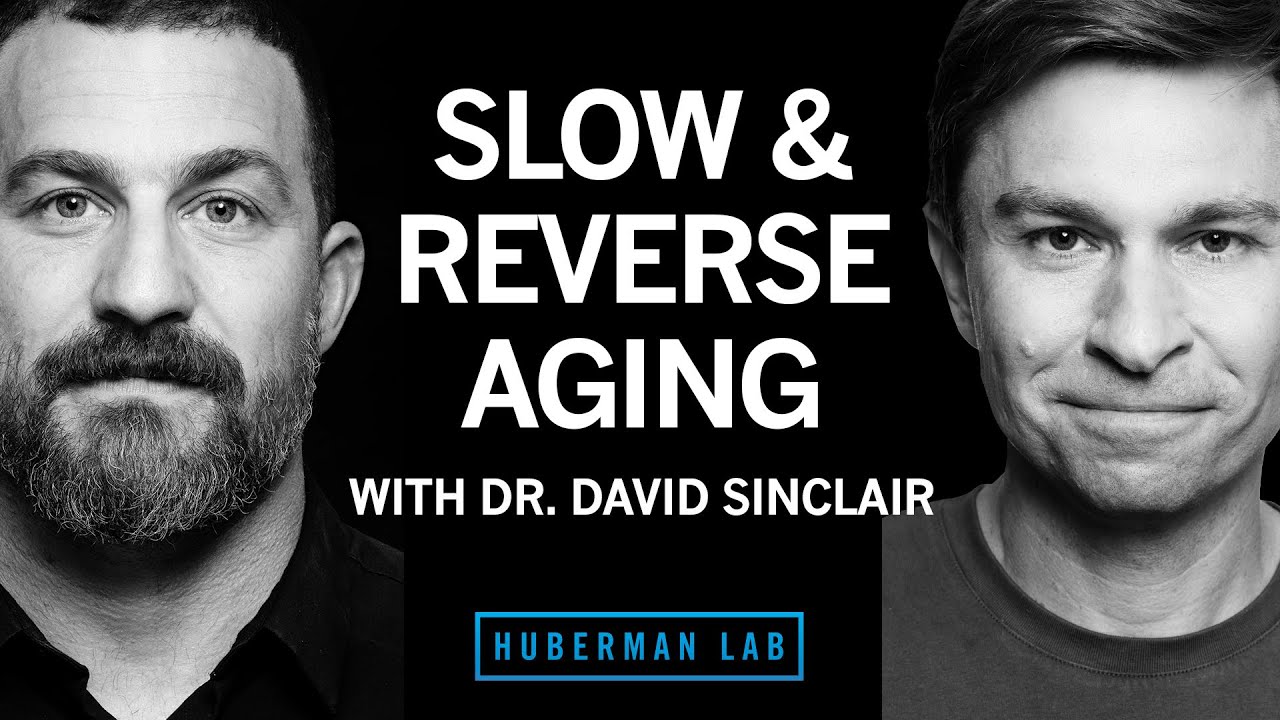- The crucial role of omega-3 fatty acids in promoting heart health, brain development, reducing triglycerides, and fighting inflammation.
- The difference between marine omega-3 fatty acids (EPA and DHA) and those found in nuts and seeds (ALA), and the best sources of omega-3s for vegans or vegetarians.
- What is the Omega-3 Index and how it is a predictive risk factor for cardiovascular disease, as well as a potential variable in Alzheimer’s and dementia risk.
- The benefits of maintaining an optimal omega-3 index, and the potential advantages of increasing omega-3 intake during pregnancy to decrease risks of premature birth and improve brain development in the baby.
- Practical advice on maintaining and monitoring omega-3 levels.
- How getting a boost of omega-3 before surgery reduces post-operational blood loss.
- The potential correlation between high omega-3 concentrations and COVID-19.
Omega-3 Index, Increasing Omega-3 to Improve Longevity & Heart Disease Risk
Omega-3 Index, Increasing Omega-3 to Improve Longevity & Heart Disease Risk
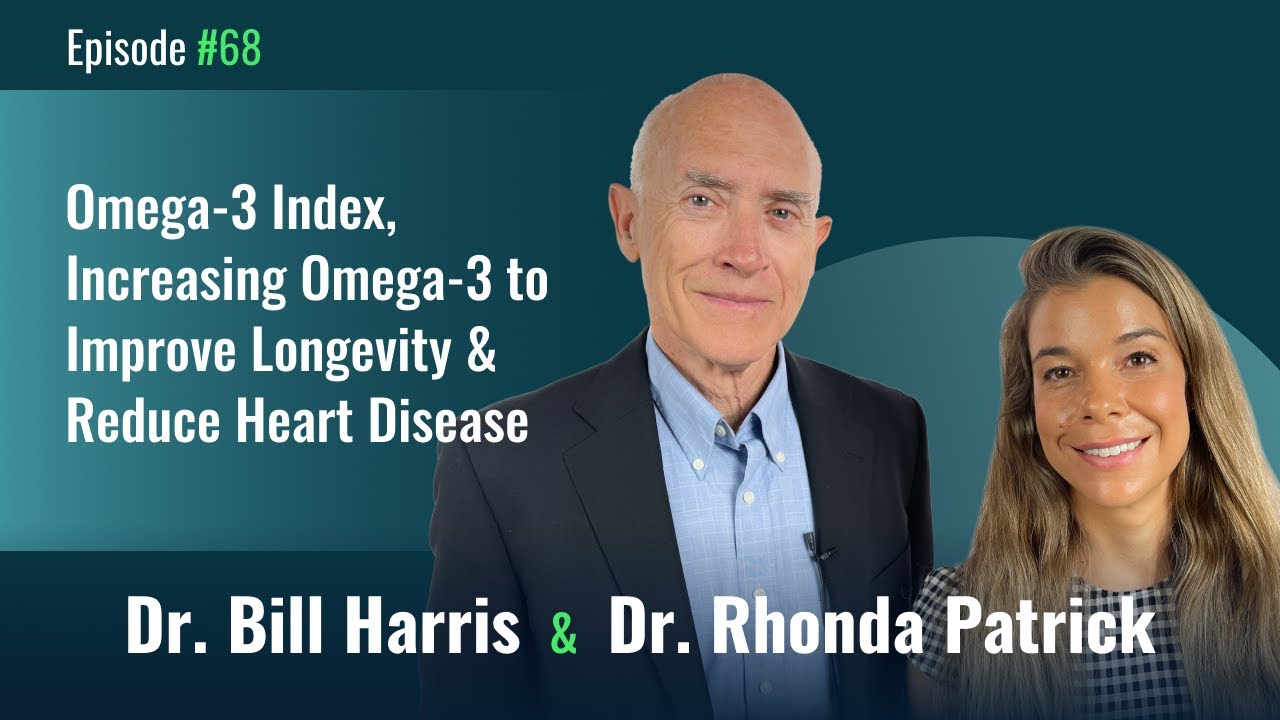
- Although there isn’t a recommended dietary allowance for omega-3s, most public health authorities suggest an intake of 1.1 grams per day for women and 1.6 grams for men to be satisfactory, with the minimum average ranging between 300-450 milligrams daily.
- Two servings of fatty fish (e.g. salmon, mackerel, sardines, and trout) per week should provide you with the above-mentioned minimum daily average of omega-3. Of the omega-3-rich fatty fish, salmon is the one with the highest level (roughly 1,5 grams of omega-3 per 150-gram serving).
- If your diet lacks fatty fish, consider taking omega-3 supplements. Aim for around 2-3 grams of omega-3 from supplements daily, and opt for reputable brands that provide pure and high-quality EPA and DHA.
- Besides supplements, vegetarians and vegans can get omega-3 from algal oil, which is actually a primary source of these fatty acids, equivalent to fish oil.
- Ask your healthcare provider about getting an Omega-3 Index test to measure your red blood cell omega-3 levels and gain insights into your cardiovascular risk, among other things. Aim to maintain a healthy Omega-3 Index, ideally between 8-12%.
- Pregnant women should focus on consuming omega-3-rich foods and possibly supplements during pregnancy, aiming for an omega-3 index above 5% to potentially reduce the risk of premature birth and promote brain development in the baby.
- If you’re about to undergo surgery, check with your healthcare provider about getting a high dose of omega-3 (around 10 grams) three or four days before the procedure to decrease post-op bleeding.
Unpacking The Omega-3 Hype
If you’ve ever wondered about the hype surrounding omega-3 fatty acids, you’re not alone. From the time two Danish scientists discovered a correlation between high levels of omega-3 fatty acids (EPA and DHA) and low rates of heart disease in Greenland’s Inuit population fifty years ago, these essential fats have garnered attention for their potential health benefits. Yet, getting our heads around their nuances is key.
Research on Omega-3 Health Benefits
What made the Danish scientists link omega-3 with the low incidence of cardiovascular disease was the fact that Inuit had relatively low triglyceride and lipid levels despite their high-fat diet. Over the last few years, however, several studies have shown that omega-3 fatty acids play a crucial role in more than one aspect of human physiology — from cardiovascular, neurocognitive, immune, and respiratory health, among other areas.
A groundbreaking trial known as REDUCE-IT supported the importance of omega-3, particularly EPA, in reducing cardiovascular-related deaths to 25%. Another large-scale study revealed a 15% lower risk of all-cause mortality among those with higher omega-3 levels. Recent studies have also shown that omega-3s act as natural anti-inflammatories and that people with higher omega-3 levels tend to have lower levels of inflammatory markers. This happens due to so-called pro-resolving mediators (SPMs) — unique molecules that reduce inflammation, promote cell regulation, and inhibit proinflammatory agents, contributing to overall cardiovascular protection.
In other areas, research has revealed that higher levels of omega-3 among pregnant women can lower the risk of premature birth whilst also helping the baby’s brain development. And although further research is required, some initial studies on the links between omega-3s and COVID-19 have suggested a potential reduction in mortality risk.
So the benefits are several and documented. But how do we turn theory into practice?
“Having a high omega-3 level is protective in the same sense that having low cholesterol is protective, in the same sense that having low blood pressure is protective.”
Dr. Bill Harris
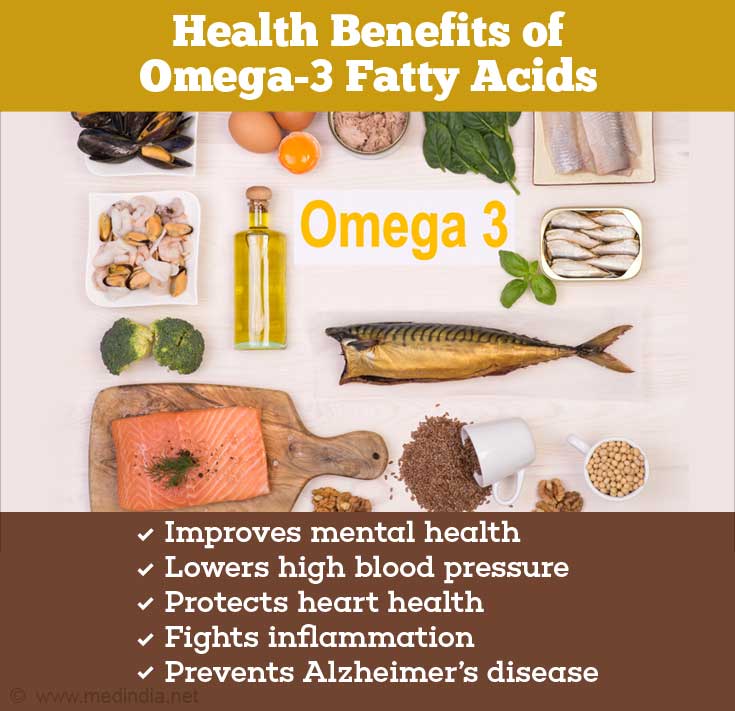
Source: https://www.medindia.net/patients/lifestyleandwellness/health-benefits-and-supplements-of-omega-3-fatty-acids.htm
The Different Types of Omega-3 Fatty Acids & How to Take Them
The most relevant omega-3 fatty acids for human health are EPA (eicosapentaenoic acid), DHA (docosahexaenoic acid), and ALA (alpha-lipoic acid). EPA is a renowned anti-inflammatory agent, supporting heart health by reducing inflammation and promoting better blood vessel function. DHA is mostly associated with brain health and the proper functioning of cell membranes. Meanwhile, ALA, found in seeds and nuts, also benefits the heart —but to a lesser extent. On that note, it’s important to recall that the conversion of ALA to EPA and DHA in the body is limited, which makes the direct consumption of EPA and DHA from marine sources or supplements vital for reaping their full advantages.
Meat-eaters can harness the benefits of omega-3 fatty acids by simply incorporating fatty fish like salmon, mackerel, and sardines into their diet. Alternatively, high-quality fish oil supplements such as Lovaza (EPA plus DHA) and Vascepa (EPA-only) can help boost your EPA and DHA intake. Vegetarians and vegans can get ALA from flaxseeds, chia seeds, walnuts, and some oils. But, as highlighted above, they also need to consume DHA and EPA. A good option is to take algal oil — an equally potent source of these fatty acids. After all, remember: fish don’t make EPA and DHA, they absorb these acids when ingesting micro-algae. That’s the original source of EPA and DHA.
Okay, but how much omega-3 do I need to be healthy?
Determining the ideal omega-3 intake for optimal health is challenging, mainly because of differences in dietary and supplemental forms, genetic variations, and individual responses to omega-3s. Although there is no established recommended dietary allowance, nutrition experts suggest a daily intake of 1.1 grams for women and 1.6 grams for men, whilst public health authorities recommend at least two weekly fish servings, which should provide roughly 300 to 450 milligrams daily. That said, recent research has shown that a daily combined dose of 1.75 to 2.5 grams of EPA and DHA can help achieve beneficial omega-3 levels of around 8 per cent for most people, linked to improved health outcomes.
But 8 per cent of what?
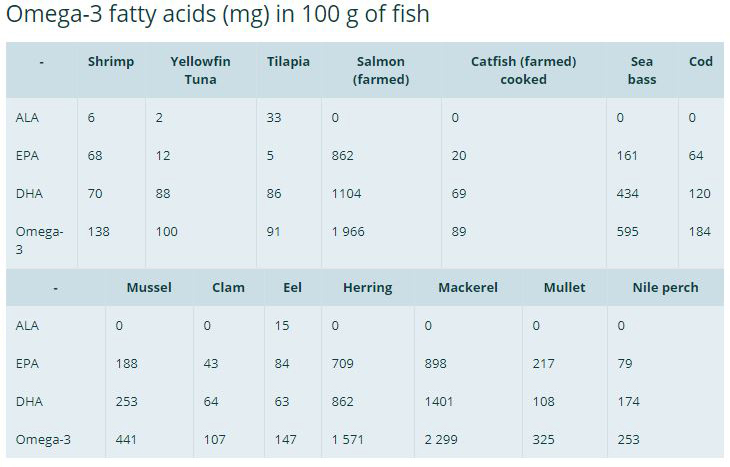
Source: https://www.fao.org/in-action/globefish/fishery-information/resource-detail/en/c/1052098/
The Omega-3 Index
8 per cent in the Omega-3 Index — a tool created to measure the concentration of EPA and DHA in the blood. Unlike conventional tests that assess omega-3s in plasma, this index gauges fatty acid concentrations in red blood cells, offering a more accurate indication of long-term omega-3 exposure and its association with sudden cardiac death. Higher Omega-3 Index levels have been associated with reduced cardiovascular mortality, making it a crucial marker of health. In other words, it’s not just about how much omega-3 you consume, but how much is circulating in your bloodstream.
So, the 8. According to the latest studies, aiming for an Omega-3 Index above 8% could benefit heart health. To give you an idea of how we as a global population are doing: the Japanese, known for omega-3-rich diets, tend to maintain levels around 9-10%, whereas the average American hovers around 5%.
“The average intake of EPA and DHA in America is something, you know, 100 to 150 milligrams a day. In Japan, it’s roughly 900 milligrams a day.”
Dr. Bill Harris
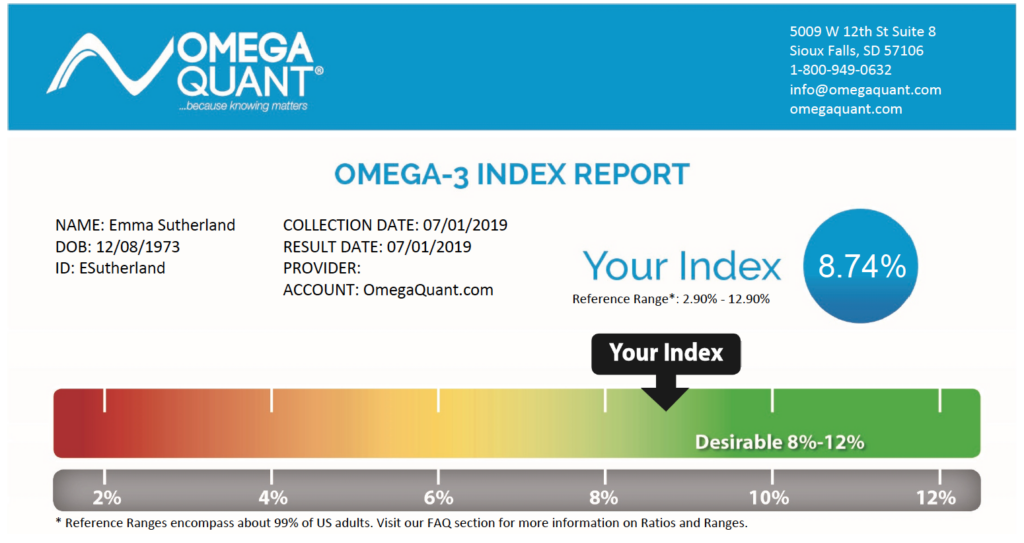
Source: https://www.studio-you.com.au/introducing-the-omega-3-index-score-whats-yours/
The Potential Side Effects of Omega-3
In general, omega-3 supplementation is considered safe. However, some studies have suggested a potential association between omega-3s and a slight increase in atrial fibrillation (AFib), particularly in individuals with pre-existing heart conditions. This theory needs to be investigated further, but it does remind us of the need to make informed decisions, even when it comes down to something as beneficial as omega-3.
Sure, some questions remain to be answered. Yet one thing is clear: these fatty acids do play a significant role in our overall health and well-being.



